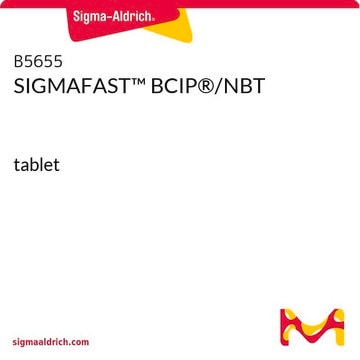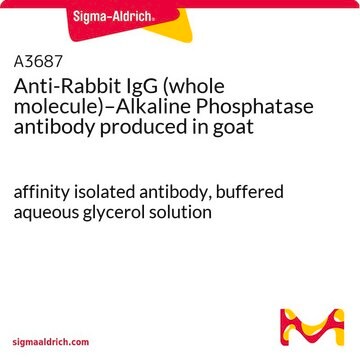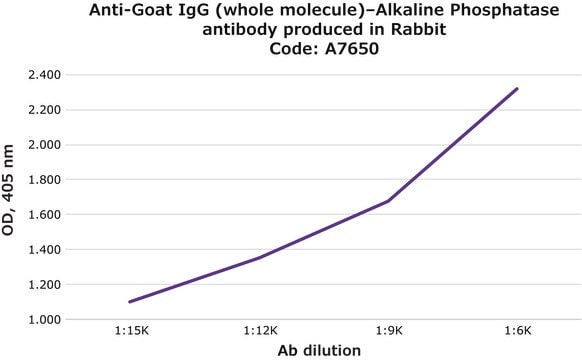A0418
Anti-Rabbit IgG (whole molecule)–Alkaline Phosphatase antibody produced in goat
IgG fraction of antiserum
Sinónimos:
Goat Anti-Rabbit IgG (whole molecule)–AP
Seleccione un Tamaño
467,00 €
Seleccione un Tamaño
About This Item
467,00 €
Productos recomendados
origen biológico
goat
conjugado
alkaline phosphatase conjugate
forma del anticuerpo
IgG fraction of antiserum
tipo de anticuerpo
secondary antibodies
clon
polyclonal
reactividad de especies
rabbit
técnicas
direct ELISA: 1:20,000
immunohistochemistry (formalin-fixed, paraffin-embedded sections): 1:40
western blot (chemiluminescent): 1:100,000
Condiciones de envío
wet ice
temp. de almacenamiento
2-8°C
modificación del objetivo postraduccional
unmodified
¿Está buscando productos similares? Visita Guía de comparación de productos
Descripción general
Especificidad
Inmunógeno
Aplicación
Western Blotting (1 paper)
Acciones bioquímicas o fisiológicas
Forma física
Información legal
Cláusula de descargo de responsabilidad
¿No encuentra el producto adecuado?
Pruebe nuestro Herramienta de selección de productos.
Código de clase de almacenamiento
10 - Combustible liquids
Clase de riesgo para el agua (WGK)
WGK 2
Punto de inflamabilidad (°F)
Not applicable
Punto de inflamabilidad (°C)
Not applicable
Elija entre una de las versiones más recientes:
Certificados de análisis (COA)
¿No ve la versión correcta?
Si necesita una versión concreta, puede buscar un certificado específico por el número de lote.
¿Ya tiene este producto?
Encuentre la documentación para los productos que ha comprado recientemente en la Biblioteca de documentos.
Los clientes también vieron
Filtros activos
Nuestro equipo de científicos tiene experiencia en todas las áreas de investigación: Ciencias de la vida, Ciencia de los materiales, Síntesis química, Cromatografía, Analítica y muchas otras.
Póngase en contacto con el Servicio técnico











